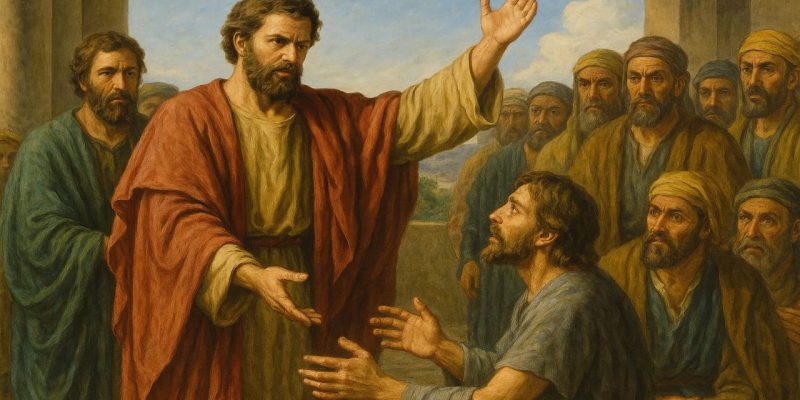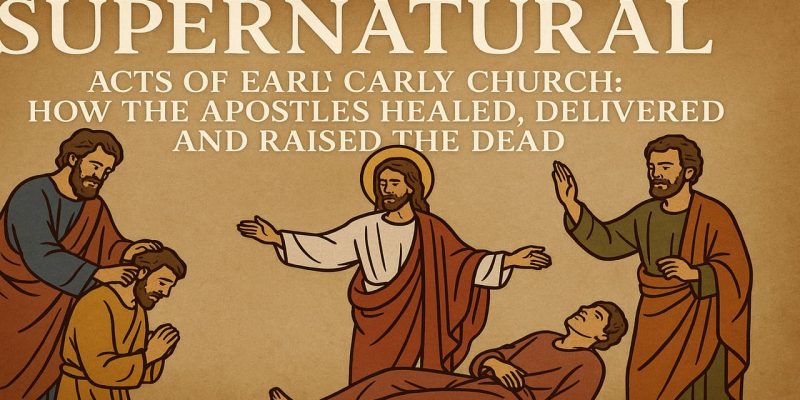Thorn Ville Church – After the resurrection of Jesus Christ, His apostles were entrusted with a mission that transcended preaching and teaching. They were called not only to speak of God’s kingdom but to demonstrate it with undeniable power. Their divine authority, bestowed through the Holy Spirit, became the power beyond words that defied natural explanation. The Book of Acts is a testament to this era, revealing how ordinary men, empowered by divine presence, carried out extraordinary feats to advance a spiritual revolution.
The apostles were not trained philosophers or political leaders. They were fishermen, tax collectors, and tradesmen ordinary people who responded to an extraordinary calling. When the Holy Spirit descended at Pentecost, everything changed. Suddenly, their words were backed by signs and wonders, affirming their message and silencing skeptics.
It was through this supernatural empowerment that the apostles demonstrated the legitimacy of their mission and the authority given to them by Christ.
Healing as a Sign of Divine Compassion and Power
One of the most prominent expressions of divine authority through the apostles was healing. From Peter’s shadow curing the sick (Acts 5:15) to Paul’s healing of a crippled man in Lystra (Acts 14:8–10), physical restoration became a key sign of God’s nearness and compassion.
These miracles were not performed for spectacle or self-glory. They served as tangible expressions of the gospel’s message that God restores, redeems, and gives life. When Peter healed the beggar at the temple gate (Acts 3), it was not just a medical miracle it was a declaration that Jesus’ power beyond words that continued even after His ascension.
Moreover, healing in the New Testament often came alongside faith. The apostles were quick to redirect attention away from themselves and toward Jesus. In doing so, they underscored that their authority was not self-generated but divinely delegated.
“Read More: India Pakistan Conflict are A Real Threat to Indonesia’s Economy”
Authority Over Spirits and the Supernatural Realm
Another striking demonstration of apostolic power was their authority over demonic forces. In Acts 16:16–18, Paul commands a spirit of divination to leave a slave girl, much to the dismay of her owners. This was not just a spiritual act it disrupted the local economy and drew widespread attention to the gospel.
The apostles’ ability to confront and overcome spiritual darkness validated their spiritual authority in realms both seen and unseen. These encounters revealed that Christ’s resurrection power had real consequences in the world, upending systems of control, oppression, and fear.
Unlike sorcerers or magicians of the time, the apostles did not manipulate or trade in supernatural power beyond words. Their authority came through obedience, faith, and intimacy with Christ, offering freedom where others offered bondage.
Boldness in Persecution: Power in the Face of Opposition
Another compelling display of divine authority was found not in miracles, but in courage. The apostles did not shrink back when confronted by opposition from religious leaders or Roman authorities. They preached boldly, healed publicly, and defied commands to remain silent.
When Peter and John were arrested and commanded not to speak in Jesus’ name (Acts 4:18–20), they responded with unwavering confidence, choosing obedience to God over fear of man. Their courage was rooted not in arrogance, but in their conviction that they had witnessed the truth.
Paul’s life was perhaps the most striking example of fearless proclamation. Shipwrecked, stoned, beaten, and imprisoned, he remained undeterred in his mission. His letters reflect the heart of one who understood that spiritual authority is most powerful when tested under fire.
Legacy of Authority: Lessons for the Modern Church
Instead of ending with a typical conclusion, let’s explore an ongoing theme: how the apostles’ demonstration of divine authority continues to impact and instruct the modern Church.
While the context has changed, the call to demonstrate not just proclaim the gospel remains the same. The authority of Christ is still available to believers through the Holy Spirit. Though not everyone is called to perform signs and wonders as the apostles did, every believer is empowered to live a life that reflects God’s power: through healing relationships, resisting evil, sharing truth boldly, and walking in love.
Churches today that embrace prayer, spiritual gifts, and missional courage often mirror the impact of the early Church. The apostolic model invites us not only to believe in God’s power but to carry it into everyday life offering hope, healing, and justice to a broken world.


